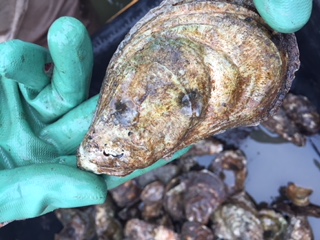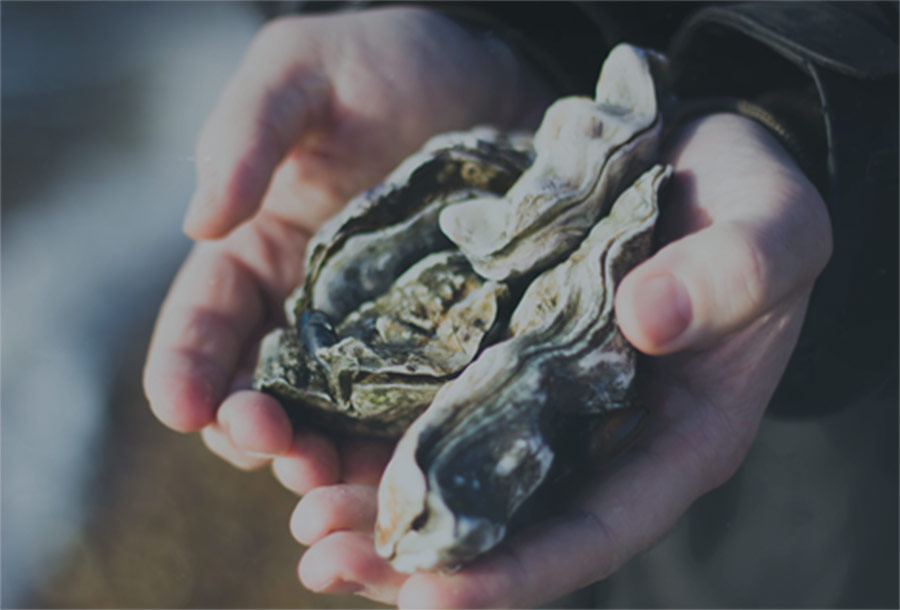Oyster Research
NY/NJ Baykeeper’s Fight for Oyster Research in NJ Waterways

On June 7, 2010, NJDEP banned research-related gardening of commercial shellfish species in waters classified as contaminated. The purpose of the ban was to minimize the risks of illegally harvested or poached shellfish. However, environmentalists argue that the concern could be mitigated through patrolling and enforcement in coastal and inner harbor waters.
Prior to the ban, organizations such as the NY/NJ Baykeeper had led successful oyster restoration and gardening programs in Raritan Bay and the Navesink River, providing valuable educational and volunteer opportunites to students and community members. Once NJDEP instituted the shellfish research ban, NY/NJ Baykeeper was forced to discard living research projects.
NJDEP Launches Offensive Against NY/NJ Baykeeper
 In the Summer of 2010 the NJDEP launched an offensive against Baykeeper’s experimental oyster reef in Keyport Harbor. NJDEP cited concerns that research oysters could be found by poachers, removed from the reef and either consumed or sold for consumption, leading to illness which would then reflect badly on New Jersey’s shellfishery. Baykeeper offered many solutions that would remove the threat even under NJDEP’s extremely unlikely chain of contingencies, but NJDEP refused any offers of compromise.
In the Summer of 2010 the NJDEP launched an offensive against Baykeeper’s experimental oyster reef in Keyport Harbor. NJDEP cited concerns that research oysters could be found by poachers, removed from the reef and either consumed or sold for consumption, leading to illness which would then reflect badly on New Jersey’s shellfishery. Baykeeper offered many solutions that would remove the threat even under NJDEP’s extremely unlikely chain of contingencies, but NJDEP refused any offers of compromise.
A Freedom of Information Act request by Bill Wolfe at wolfenotes.com revealed that NJDEP was using Baykeeper’s oyster program as a fall guy to cover NJDEP’s many years of underfunding shellfish patrols. The federal Food and Drug Administration oversees shellfisheries and requires patrols to ensure that shellfish are harvested from approved areas. For years, NJDEP had underfunded its program and left this important industry dangerously exposed to FDA closure. Rather than doing something by expanding patrols in Raritan Bay, NJDEP opted to look like it was doing something by enforcing against Baykeeper.
Baykeeper’s permit allowed oysters to grow on the reef under certain conditions and allowed NJDEP to order their removal before they reached market size. Though NJDEP never ordered their removal, they issued a Notice of Violation to Baykeeper for not removing the oysters, a clear procedural error. Nevertheless, given that some oysters were approaching market size, Baykeeper ultimately agreed to remove the shellfish.
Shortly thereafter, the DEP rejected an application for a separate oyster restoration site in the Shrewsbury River, claiming that the proposed site was poorly chosen and that restoration activities would (ironically) interfere with shellfish habitat. Baykeeper has requested a hearing for both of these decisions. NJDEP has responded to neither request, but in the meantime has agreed to permit oyster research at the Naval Weapons Station Earle, where security is provided by the United States Navy.
Resources
- NY/NJ Baykeeper, Fighting to Protect the Harbor Estuary, ROI-NJ, 8/27, 2018
- Thousands of Baby Oysters Have Been Enlisted to Protect this N.J. Naval Base, NJ.COM, 8/26/2018
- NY/NJ Baykeeper Deploys Oyster Reefs off Leonardo Marina, Middletown Patch, 8/17/2018
- NY/NJ Baykeeper Deploys 1.5 Million Oysters to Expand Living Shoreline, AH Herald, 8/16/2018
- Navy Teams with NY/NJ Baykeeper to Help Increase Oyster Population, News 12, 8/14/2018
- Environmentalists Use Oysters to Help NY/NJ Coast, WFUV, 8/13/2018
- Navy Teams with NY/NJ Baykeeper to Help Increase Oyster Population, New Jersey Environment News, 8/15/2018
- Oysters Have Friends: NY/NJ Baykeeper to Deploy 1.5 Million Oysters to Expand Living Shoreline, TAPinto Holmdel & Colts Neck, 8/14/2018
- Baykeeper to Deploy 1.5 Million Oysters to Expand Living Shoreline, JerseyShoreVibe 8/9/2018
- Group Restores Oyster Reef in Bronx River, News 12 NJ, 6/20/18
